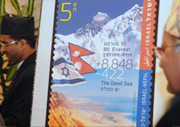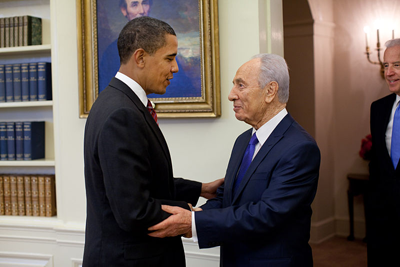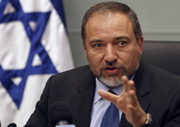Foreign Affairs
- Details
- Written by Prime Minister's Media Adviser
- Details
- Written by Office of the President
His Majesty King Abdullah II of Jordan on Sunday met with Israeli President Shimon Peres on the sidelines of the World Economic Forum at the Dead Sea. The two leaders discussed ways to revive peace negotiations in the region and means to overcome obstacles facing the peace process.
His Majesty and President Peres stressed that the two state solution is the only viable solution to end the conflict, achieve peace between the Palestinians and Israelis and enhance security and stability in the region.
King Abdullah also highlighted the importance of the Arab Peace Initiative to realize a just and comprehensive peace in the region.
President Peres stressed that it is time to promote peace and help build a better future for coming generations and thanked His Majesty for his efforts to promote peace.
The two leaders hailed the US administration's efforts, led by US Secretary of State John Kerry, to revive the peace process.
- Details
- Written by Israel MFA
 What is common to the Dead Sea and Mount Everest? After 52 years of diplomacy, Israel and Nepal issued a joint stamp - The Highest and Lowest Places on Earth.
What is common to the Dead Sea and Mount Everest? After 52 years of diplomacy, Israel and Nepal issued a joint stamp - The Highest and Lowest Places on Earth.
- Details
 President Shimon Peres sent a letter of condolence to President Obama on behalf of the people of Israel following the tragic shooting in the USA.
President Shimon Peres sent a letter of condolence to President Obama on behalf of the people of Israel following the tragic shooting in the USA.click here
- Details
- Written by Israel Foreign Minister’s Bureau
 FM Liberman to inaugurate new embassy in Albania
FM Liberman to inaugurate new embassy in Albania
FM Liberman will meet with senior Albanian officials and inaugurate the new Israeli embassy in Tirana.
Deputy Prime Minister and Minister of Foreign Affairs Avigdor Liberman will left on Wednesday 1 August 2012 on an official visit to Albania. In Tirana he will meet with President Bujar Nishani, Prime Minister Sali Berisha, Minister of Foreign Affairs Edmond Panariti, Deputy Prime Minister and Minister of Economy, Trade and Energy Edmond Haxhinasto and opposition leader Edi Rama. FM Liberman will also hold additional meetings.
Page 1 of 2








